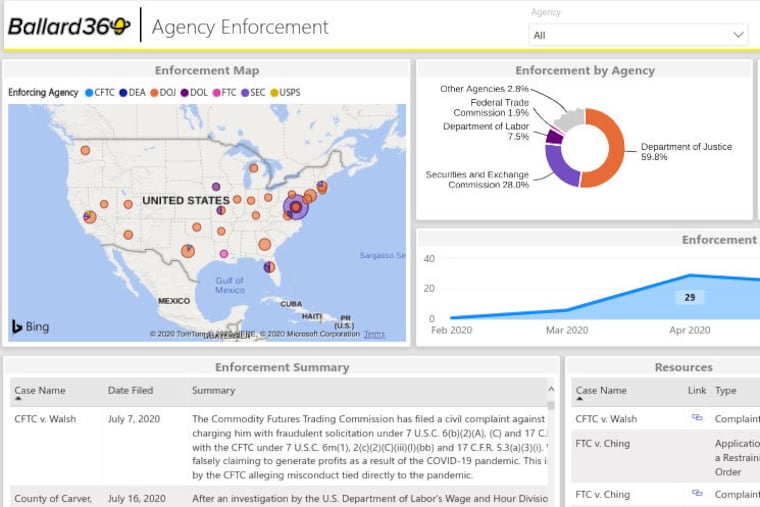Ballard Spahr law firm becomes hub for vital COVID-19 information for businesses
The Philadelphia firm added the fraud tracker to its comprehensive COVID-19 Resource Center for businesses. Its goal is to "proactively partner with clients to help identify trends so we might foresee legal issues, And this is an excellent way to to that.”

A major Philadelphia law firm is becoming a nexus of coronavirus information for businesses.
Ballard Spahr, the venerable white-shoe powerhouse, this week launched its Stimulus Enforcement Tracker, which monitors CARES Act and COVID-19-related fraud enforcement across the nation. It also supplies daily policy alerts and coronavirus updates from federal agencies free online .
The Stimulus Enforcement Tracker is just the latest component of Ballard’s comprehensive COVID-19 Resource Center, a one-stop shop for pandemic-driven business trends, legislation, and regulations.
“When there’s a lot of government spending, there’s going to be a lot of fraudsters,” said Terence M. Grugan, a member of Ballard Spahr’s white collar defense, securities enforcement, and anti-money laundering practice groups.
Grugan saw the potential for trouble in distributing the more than $2 trillion in government funds and decided that Ballard should take a role in monitoring efforts of government agencies trying to contain abuse.
“When the CARES Act was announced, the numbers of dollars were staggering. The act touches every segment of industry and society. There were huge amounts of money going out the door very quickly. And it was obvious to us there’d be a tremendous amount of fraud in these programs.”
The Enforcement Tracker is a collaborative effort between the white collar group and the firm’s groundbreaking client value and innovation team. Ballard also publishes blogs on numerous legal topics and a newsletter on financial corruption called Money Laundering Watch.
The tracker identifies stimulus enforcement trends, discerns which federal agencies are the most active, determines which priorities are emerging, and maps the regions of the country that are receiving the most scrutiny.
» READ MORE: Philly-area law firms received at least $228 million, the most of any industry for coronavirus cash
“We can see in detail what is happening and get a handle with what is coming down in the future,” said Melissa Prince, Ballard’s chief client value and innovation officer. The tracking project is just the latest in “value-added” services for clients and the general public.
“Law firms now have the ability to collect and report on data in a more robust way than we’ve ever done before,” said Prince. “The purpose is to be more in tune with our clients. Being a good lawyer used to be only about quality legal work and forging deep relationships with clients. But the new law firm normal is to proactively partner with clients to help identify trends so we might foresee legal issues, And this is an excellent way to to that.”
» READ MORE: Five Philly law firms are among best for women attorneys, according to study
The firm will keep the entire data base free.We don’t intend to charge for it,” she said. “There are other firms who do that. that’s not our goal.”
The different elements of the COVID-19 Resource Center can be customized for individual clients. Ballard’s legislative tracker, which was released earlier this year, was modified for a private equity client that was seeking outside investors and wanted to buy companies in a certain area.
“We demoed that to the client this week, and they were absolutely thrilled,” Prince said. “That’s the purpose of these technological projects: To develop additional business for the clients and be a great partner for them.”
» READ MORE: What’s driving the big law firm mergers in Philly and across the U.S.?
Enforcement actions against COVID-19 related fraud are just getting started, Grugan said.
“Up till now it’s been mostly low-hanging fruit,” he said. “For instance, a guy in Texas applied for millions in relief for his nonexistent company and his nonexistent employees. It will take time for the more intense investigations to develop-- at least until [the investigators] are allowed back into their offices.”
In the meantime, Grugan and Prince want people to dive in, explore the Resource Center and use their trackers.
“It’s new to us, so it’s new to everybody,” Prince said. “We’re eager for feedback right now. We want to hear from people and business about what they find useful. We’re still figuring out what people want to see and what they don’t. "